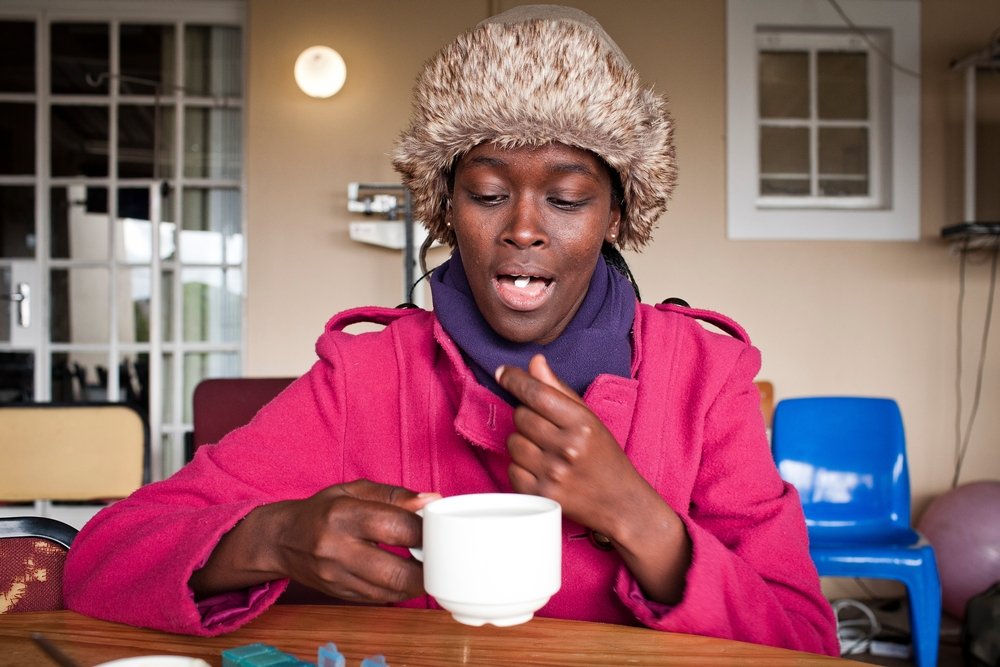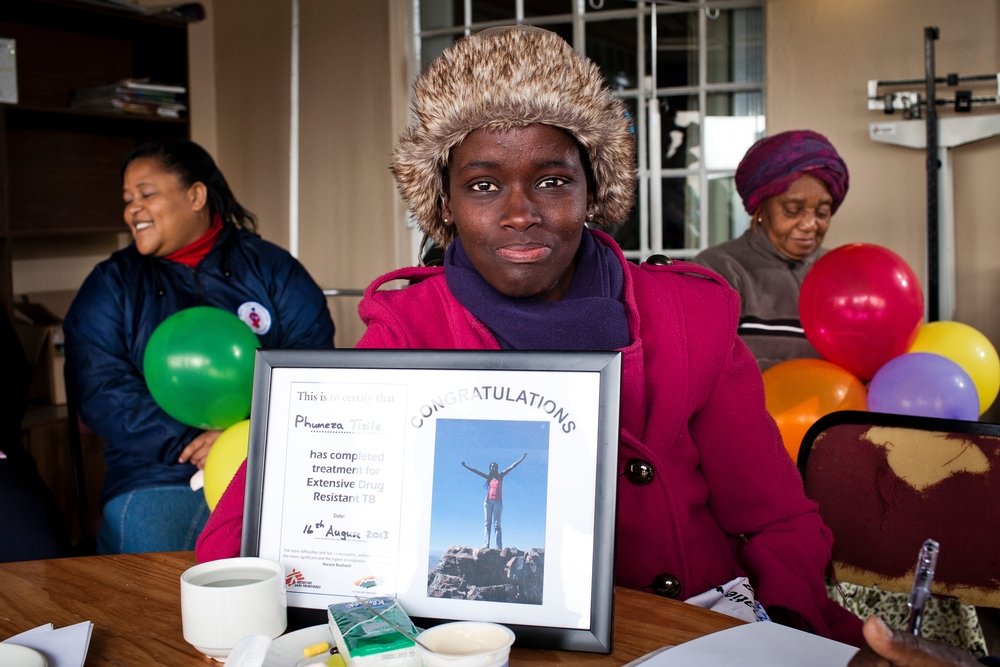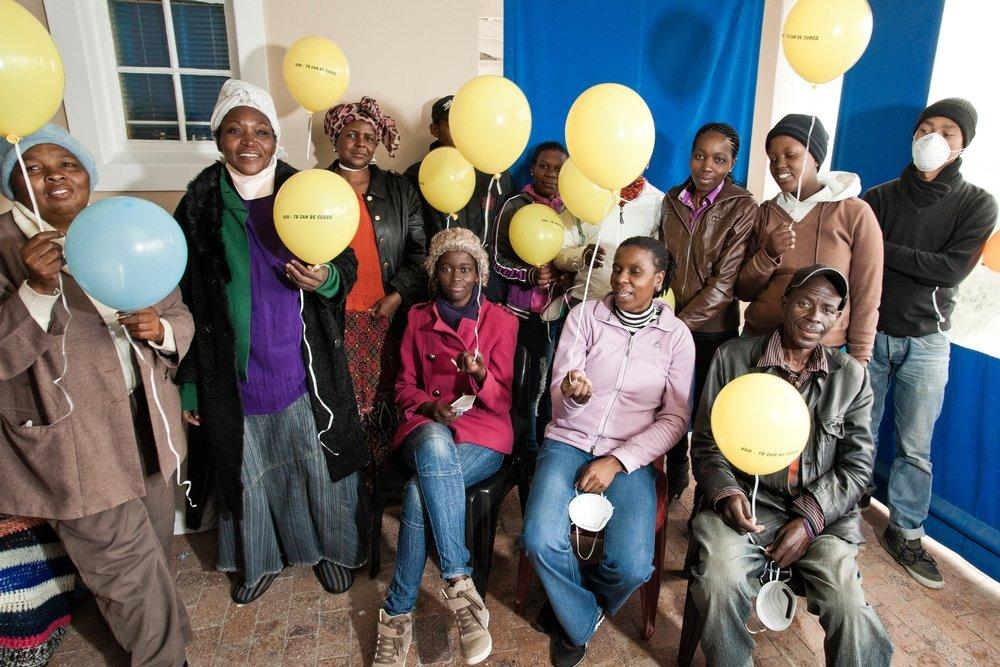
KHAYELITSHA – The complete cure of a young woman for one of the most severe forms of drug-resistant tuberculosis (DR-TB) using a high-strength antibiotic in South Africa brings fresh hope for thousands of patients facing a less than 20% chance of treatment success with standard treatments.
On Friday 16 August Phumeza Tisile, aged 23, swallowed the final tablet in her gruelling 2 year-long treatment for extensively drug-resistant TB (XDR-TB) at the Lizo Nobanda TB Care Centre – formerly run by Doctors Without Borders (MSF) – in the Western Cape.
Her cure depended on an antibiotic, linezolid, as part of an individually tailored treatment regimen which MSF provides for selected patients as a salvage strategy after all other TB treatments have failed. Phumeza is the first-ever patient in MSF’s ‘strengthened regimen’ pilot programme to be cured using linezolid which currently has limited availability in the public sector.
“What makes Phumeza’s story inspiring is that when she started, her chances of cure were even less than the 20% treatment success rate that we often associate with XDR-TB diagnosed patients who are offered the standard XDR-TB treatment regimen,” says Dr Jennifer Hughes, MSF TB doctor and Phumeza’s treating physician. “Phumeza’s cure is nothing short of miraculous, and is due to access to a more effective drug and her sheer determination to beat the disease.”
In June 2013, at the 6th South African AIDS Conference in Durban, MSF presented clinical data from its ‘strengthened regimen’ pilot programme, the first of its kind in Africa. The results indicate that 71% of the pilot programme patients who took linezolid as part of their regimen, including Phumeza, had ‘culture-converted’ –an early indicator that the two-year treatment regimen will be successful.
Phumeza’s cure, as well as the evidence of linezolid’s efficacy as an XDR-TB drug, is good news for South Africa, where over 10,000 people a year are diagnosed with drug-resistant forms of the disease. Generally, between 5% to 8% of DR-TB patients are resistant to the few second-line TB drugs available and have XDR-TB.

Before being treated by MSF, an accurate diagnosis of Phumeza’s XDR-TB was delayed due to the lengthy process required to confirm XDR-TB infection using available diagnostic tests. This meant Phumeza received ineffective treatment for drug-sensitive TB through the public sector before learning she had XDR-TB. In addition Phumeza also suffered serious side effects that affect many people on DR-TB treatment, including permanent deafness. By the time dr Hughes started treating Phumeza with linezolid in May 2011, she had already received nine months of unsuccessful treatment.
Despite the initial good news which linezolid promises for DR-TB treatment, the drug remains out of reach for most patients in South Africa due to its prohibitively high cost—a two-year-long course of treatment for a DR-TB patient like Phumeza, costs over R493,000 per patient when purchased through the private sector. While the Department of Health buys linezolid at less than half the private sector price, the product is not registered for use as TB treatment. This limits doctors’ ability to prescribe the drug through the public sector at a lower price. Pharmaceutical company Pfizer is the sole supplier of the drug because it holds multiple patents on linezolid in South Africa.
These patents block access to quality-assured generic alternatives available in other parts of the world, sold at a fraction of the Pfizer price. Even with the positive prospects of using linezolid as a DR-TB drug the Department of Health has not yet tried overcoming these patent barriers through the available flexibilities under international trade agreements.
“The high cost in both the public and private sectors limits doctors’ willingness and ability to prescribe the drug for their patients. The growing DR-TB epidemic in South Africa demands effective new tools like linezolid at more affordable prices. Patients for whom current available DR-TB treatment is failing cannot afford to wait,” says Dr Hughes.
Now that she is cured from XDR-TB, Phumeza can resume normal life after a three year hiatus imposed by intensive treatment during which she had to take more than 20,000 pills.
“I want to follow the big dreams I had before XDR-TB: to go back to university, complete a degree and find a job I love. But I will have to work around my deafness,” she says.
Phumeza also wants to continue her work as DR-TB treatment activist to inspire others: “I want patients to know that XDR-TB is curable. It’s not easy but you have to keep taking your treatment as prescribed. It seems impossible – until it’s done.”
NOTES TO EDITORS
WHAT IS XDR-TB?
Extensively drug-resistant TB form of TB which is resistant to at least four of the core anti-TB drugs. XDR-TB involves resistance to the two most powerful anti-TB drugs, isoniazid and rifampicin, also known as multidrug-resistance (MDR-TB), in addition to resistance to any of the fluoroquinolones (such as ofloxacin or moxifloxacin) and to at least one of three injectable second-line drugs (amikacin, capreomycin or kanamycin). MDR-TB and XDR-TB both take substantially longer to treat than ordinary (drug-susceptible) TB, and require the use of second-line anti-TB drugs, which are more expensive and have more side-effects than the first-line drugs used for drug-susceptible TB. (Source: WHO)
ABOUT XDR-TB IN SOUTH AFRICA:
South Africa recorded its first case of XDR-TB in 2006. Since then, cases have been reported in most provinces. In 2010, 741 cases of XDR-TB were recorded, though health officials recognise that the figure may be higher.
ABOUT MSF’S DR-TB ‘STRENGTHENED REGIMEN’ PILOT PROGRAMME:
The ‘strengthened regimen’ programme is being piloted within the well-established Decentralised Drug Resistant TB (DR-TB) Programme in Khayelitsha.
Since July 2011, 22 patients with pre-XDR or XDR have received individually tailored regimens of drugs (including linezolid). Phumeza was the first patient enrolled on the SR programme to receive linezolid, and the first patient on linezolid to be cured.
ABOUT LINEZOLID:
The pharmaceutical company Pfizer holds several patents on linezolid in South Africa, which both limits linezolid’s wider use for treating DR-TB, and prevents generic competitors with lower-priced products from entering the market. The national Department of Health buys linezolid from Pfizer for R287 per 600mg tablet, but because Pfizer has not registered linezolid for use against TB, doctors in South Africa have limited ability to prescribe the medication. MSF currently pays R676 per tablet through the private sector for the Pfizer product—for a two-year course of treatment, this is over R493,000 for one patient alone.
MSF has urged the South African Department of Health to pursue options for sourcing more affordable, quality-assured generics of linezolid. This could include fast-tracked registration of generic linezolid products in South Africa; opening a TB drug tender for linezolid to a broad range of bidders, or pursuing flexibilities available under international trade agreements, such as compulsory licensing.
MORE ABOUT PHUMEZA:
Phumeza was first diagnosed with tuberculosis in May 2010; she started linezolid in July 2011.
Since she started treatment with MSF in 2011, Phumeza has became a global advocate for better diagnosis and treatment of DR-TB. Her regular TB+ME blog received over 15,000 views and countless comments, and she co-authored a DR-TB manifesto on behalf of DR-TB patients worldwide. In April this year she also shared her experiences with South African singer Lira and appeared in ‘Exposed’, a 4-part series on the global rise of drug resistant TB produced by Aeras.
FOR MORE INFORMATION & TO ARRANGE INTERVIEWS CONTACT:
Kate Ribet, Media Liaison Officer, MSF SA
kate.ribet@joburg.msf.org | 079 872 2950 | @kateribet
Find out about MSF in South Africa
